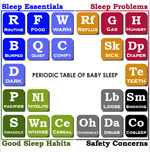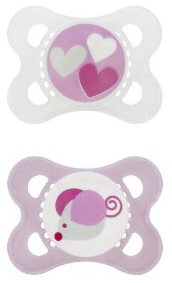Sometimes your baby will wake up in the middle of the night when he or she normally would sleep right through. The same thing can happen at nap time. There’s no need to panic! This is not as disastrous as it seems.
My twins often wake up in the midst of a sleep cycle; nine times out of ten, I can soothe them back to sleep within a few minutes. Do it right, and your properly soothed infant will probably sleep for hours more.
Do it wrong, however, and you’re dealing with a stressed baby that’s now completely off his regular sleep schedule. Here are some tips for soothing your baby back to sleep.
1. Count to Ten
If you can, wait ten or twenty seconds before entering your baby’s room. Sometimes they fuss a little, and then go right back to sleep. Of course, you might not have this luxury if there are other sleeping children in the room (as in twins) or down the hall.
2. Skip the Grand Entrance
The worst thing you can do when a baby wakes up suddenly is barge in, throw on all the lights, and pick him right up. I find that the best soothing takes place in the dark and in the quiet, with as few stimuli as possible. Slip into the room, get the baby comforted, and slip out again.
3. Keep the Baby Close
If your baby wakes up in the middle of the night and you want to soothe him or her quickly, think about getting a mini crib or bassinet and keeping it in your room. That way you can reach out and calm your baby back to sleep without even getting out of bed.
4. Install a night light or small lamp
Make sure it’s within easy reach. This will give you enough light to see by but without over-stimulating the infant. It’s a handy way to help you (1) hunt down missing pacifiers, and (2) not wipe out on heavy pieces of furniture.
5. Find and re-insert the pacifier.
Half the time I can’t find the one that the baby went to bed with, so I keep one at each end of the crib and another on a nearby nightstand. You can’t ever have too many pacifiers. See also our review of the best baby pacifiers.
6. Touch your baby and quietly reassure him.
I usually stroke his head, very gently, and tuck the Aden+Anais blanket back down around him. Much of the time, this is all I have to do, and the baby goes right back to sleep.
7. Pick your baby up
Do this only if the previous two things don’t work. It’s far easier to get a baby back to sleep when he’s already in bed. Often your presence alone is enough.
8. Rock your baby.
If you have a rocking chair in the room, which I recommend, use it now. Sometimes my boys don’t care for the motion of the rocker and I have to stand up to rock them. Either way, find a position and motion that gets your baby calm.
9. Keep the pacifier in
unless your baby actively pushes it out. Sometimes the baby will turn his head back and forth against you, losing the pacifier in the process. This doesn’t mean he doesn’t want it, he’s just stressed. If he doesn’t want the pacifier, he’ll push it out with his tongue and rear back when you try to put it back in. Invest in good pacifiers so that this isn’t an issue.
10. Put the baby to your shoulder and pat his back.
Just like you’re burping him. Sometimes this will even produce a belch, which was likely what roused him. You need to address gas (ideally before putting baby to bed), because a gassy baby won’t sleep.
Try humming, singing, or a music box. The effectiveness of these varies substantially between infants, but if it’s something your baby likes (and has been comforted by in the past), do it. See my review of soothers and sound machines for baby’s room.
Still Struggling?
If you’ve tried all of the above and your baby’s still crying, something is probably wrong. We’re beyond soothing at this point: you need to find the problem and fix it. I have an entire post breaking down the reasons a baby won’t sleep. Usually, I like to start with a diaper check. This is something you can fix (change) right there and in relative quiet, without waking your baby up too much. Never underestimate the importance of diapers for sleeping.
Over time, you’ll learn to recognize the signals your infant gives you. Nuzzling at you and slurping heavily on the pacifier usually means hunger. A baby that arches his back and cries in apparent discomfort probably has gas or digestive discomfort. Find the problem, fix it, rock your baby a little bit, and put him back to bed. You can often do it in less than five minutes.
What To Read Next
If you like this article, you might want to subscribe by e-mail or RSS so that you’re notified when new content is posted.
 |
 |
 |
 |
| Best Baby Pacifiers has our recommendations for newborns, older babies, and teething infants. | Baby sleep problems takes you through the most common sleep issues and how to address them. | The periodic table of baby sleep has all the essential elements for healthy baby sleep habits. | Visit our sleep training section for strategies and tips for teaching your baby to sleep through the night. |




